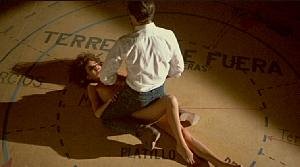
Matador (Pedro Almodovar, 1986)
Pedro Almodovar's Matador opens with a montage of scenes from movies where women die violent and bloody deaths. The audience of the gruesome montage is Diego (Nacho Martinez), a prominent bullfighter who is reduced to teaching young hopefuls his former craft after he got gored at one match. At first glance, we are aware that Diego is a deranged man --- we welcome the character masturbating to a montage of women suffering and dying. Then, we see him at work; he explains to his students the art of making a kill. As he teaches, Almodovar inserts a thematically related sequence of Maria (Assumpta Serna) inviting a man to her room, undressing him, and finally, stabbing him at the back of his neck with a hairpin, killing the erstwhile lover almost instantly.
Angel (Antonio Banderas) is one of Diego's student. Angel, who badly wants to become a bullfighter but faints at the sight of blood, has lived under the wing of his ultra-religious mother. Virgin at the age of twenty two, Diego asks him if he's homosexual, and Angel denies such and is determined to prove to his maestro his masculinity. That night, Angel attempts to rape Eva (Eva Cobo), his neighbor and Diego's girlfriend, but only succeeds in prematurely ejaculating; and suddenly faints when Eva accidentally slips to reveal a bloody head wound. Probably sick and tired of his mother's ultra-conservative prodding, Angel admits to the rape and the other murders that has recently happened.
Almodovar, with Matador, concocts a black comedy wrapped in trappings of absurd romanticism and fantabulous machinations. Despite the numerous jumps from logic and grandiose U-turns from reality, Matador works very well. Almodovar paints the film with a stylistic hue that makes each and every fantastic plot twist and revelation, both surprising and expected. For example, there will be scenes wherein Almodovar will whisk away your attention from the absurd sexual fetishes of the astrologically-crossed lovers by focusing his attention to the ex-matador's student's crotches while they practice their dangerous craft. It's as if Almodovar makes you aware that bullfighting is not merely an entertainingly dangerous sport, but is also a bastion of Spanish masculinity verging on the homoerotic. Almodovar cuts the montage with the image of the police inspector glancing at those young student's crotches; and with that Almodovar surprises by not only poking fun at the macho sport, but poking fun at the uniformed detective, who after that scene rejects an offer by the psychiatrist (Carmen Maura) to sleep with him that night.
Almodovar maintains that volatility throughout the film. There is no telling what might happen next, and that creates a wildly-imaginative goose chase of something that might or might not happen. Almodovar's visuals is delightfully inventive, especially for the final fifteen minutes, wherein everything breaks loose turning the film into an implosion of almost everything that should not have happened if the film was a conventional one. Almodovar betrays his murder mystery, his romanticism, his satire, his commentaries on Spanish machismo, to conclude Matador in a fashion that is so outrageously absurd, yet in a strangely compelling way, lovely. There's nothing more romantic than a highly romantic urge being completed when the sun and the moon meet in the sky --- and with that, you can't help agree with the police officer saying that he's never seen anybody happier.







wm.jpg)

























.jpeg)





2 comments:
Matador remains, for me, the best example of Almodovar working in all his themes into a taut, well-told tale ... it is hard to watch at times, but always rewarding
I sort of agree (I haven't seen much Almodovar). I just buy everything that happens onscreen despite the fact that everything's just so out of this world, and the sexual atmosphere of the movie is so primal.
Post a Comment